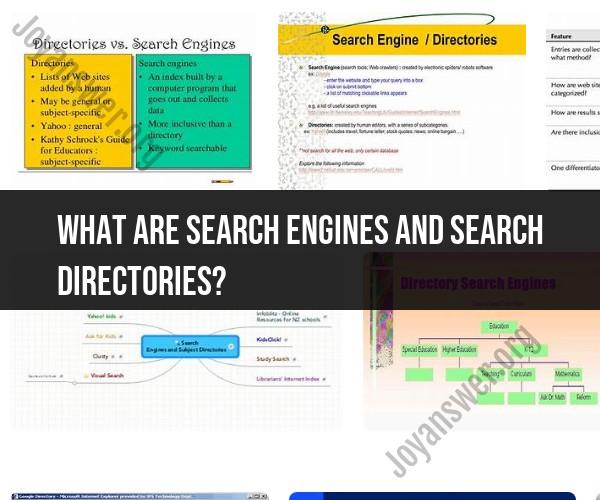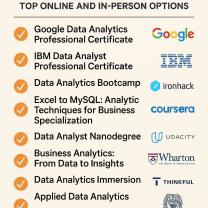What are search engines and search directories?
Search engines and search directories are both tools used for finding information on the internet, but they operate in slightly different ways and serve different purposes. Here's an explanation of the difference between the two:
Search Engines:
Crawl and Index: Search engines like Google, Bing, and Yahoo use automated programs called web crawlers or spiders to continuously browse the internet and collect information from websites. These programs index the content of web pages, creating a massive database of web pages and their content.
Algorithm-Based: Search engines rely on complex algorithms to determine the relevance of web pages to specific search queries. When you enter a search query, the search engine uses its algorithms to rank and display a list of web pages that it believes are most relevant to your query.
Real-Time and Comprehensive: Search engines provide real-time search results and are constantly updating their indexes to reflect the most current information available on the internet.
Examples: Google, Bing, Yahoo, DuckDuckGo are some of the popular search engines.
Search Directories:
Manually Organized: Search directories are human-curated collections of websites organized into categories and subcategories. These directories are typically created and maintained by people who review and categorize websites based on their content.
Limited in Scope: Unlike search engines, search directories do not crawl the entire web or index the content of web pages. They only include websites that have been submitted for inclusion, and each site is usually reviewed by a human editor before being added to the directory.
Structured Browsing: Users of search directories can browse through categories and subcategories to find websites related to their interests. It's a more structured and organized approach to finding information.
Examples: Yahoo Directory (which has been largely phased out), the Open Directory Project (DMOZ), and specific niche directories are examples of search directories.
Key Differences:
Automation vs. Manual Review: Search engines use automated algorithms to provide search results, while search directories rely on human editors to categorize and review websites.
Comprehensiveness: Search engines aim to index a vast portion of the web, offering a wide range of search results. In contrast, search directories have a limited scope because they only include websites submitted for inclusion.
Real-Time vs. Static: Search engines provide real-time results, while search directories tend to have static listings that are updated less frequently.
Browsing vs. Querying: Search directories encourage browsing through categories, whereas search engines rely on users entering specific search queries.
In summary, search engines are automated tools that provide a wide range of search results based on algorithms, while search directories are human-curated collections of websites organized into categories for structured browsing. Both can be useful depending on your specific information-seeking needs and preferences. However, search engines are generally more popular and widely used for general web searches due to their comprehensive and real-time nature.
Search Engines vs. Search Directories: Exploring the Differences
Search engines and search directories are two different ways to search for information online. Search engines use software to crawl the web and index websites, while search directories are compiled by humans.
Search engines are the most common way to search for information online. They work by crawling the web and indexing websites. When a user enters a search query, the search engine returns a list of websites that are relevant to the query. The relevance of the websites is determined by a variety of factors, such as the content of the website, the keywords used on the website, and the number of other websites that link to the website.
Search directories are compiled by humans. They organize websites into categories and subcategories. When a user searches for information on a search directory, the directory returns a list of websites that are relevant to the search query. The websites are listed in the categories and subcategories that they belong to.
Search Engine or Directory? Selecting the Right Tool
The best tool for searching for information online depends on the type of information you are looking for. If you are looking for specific information, such as the address of a website or the definition of a word, then a search engine is the best tool to use. If you are looking for general information on a topic, then a search directory may be a better tool to use.
Here is a table that summarizes the key differences between search engines and search directories:
| Feature | Search engine | Search directory |
|---|---|---|
| How it works | Crawls the web and indexes websites | Compiled by humans |
| Type of search results | List of websites that are relevant to the search query | List of websites that are organized into categories and subcategories |
| Best for | Finding specific information | Finding general information on a topic |
Navigating the World of Online Search: Search Engines and Directories
Search engines and search directories are both valuable tools for navigating the online world. By understanding the differences between the two, you can choose the right tool for the job.
Here are some tips for using search engines and search directories effectively:
- Use specific keywords: When searching for information online, use specific keywords. This will help you to get more relevant results.
- Use advanced search features: Most search engines and search directories offer advanced search features. These features can help you to narrow down your search results and find the information you are looking for more quickly.
- Evaluate your search results: Not all search results are created equal. It is important to evaluate your search results and choose the websites that are most relevant and authoritative.
By following these tips, you can use search engines and search directories effectively to find the information you need online.












